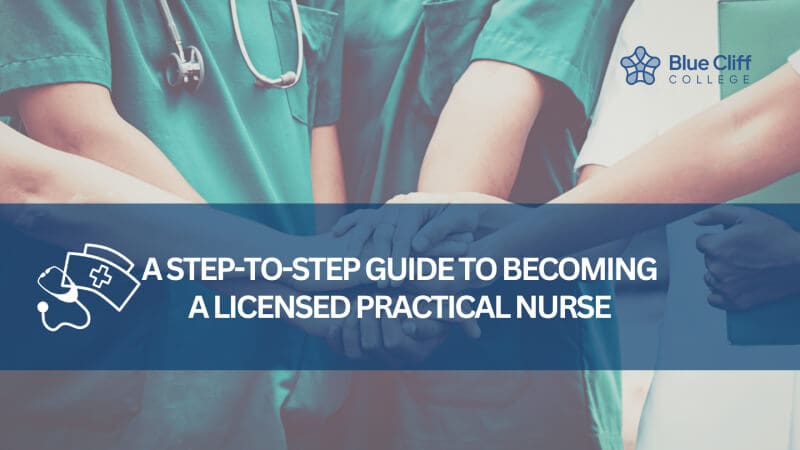It’s time to start a career, not look for another job. You have the desire to make a real difference. You are looking for an industry with entry-level positions that will pay the bills and has clear professional and educational paths to opportunities for advancement. It’s time to begin your career in the healthcare industry. Start with Blue Cliff College’s Clinical Medical Assistant (CMA) Program.
Take the first step in your career journey today!
What Does A CMA Do?
According to the Bureau of Labor Statistics’ Occupational Outlook Handbook Clinical Medical Assistants’ duties typically consist of¹:
- Recording patient history and personal information
- Measuring vital signs, such as blood pressure
- Helping physicians with patient examinations
- Giving patients injections or medications as directed by physicians and as permitted by state law
- Scheduling patient appointments
- Preparing blood samples for laboratory tests
- Entering patient information into medical records
CMA’s duties can vary depending on the state where they work and the specialization of the medical facility. According to the BLS, CMA’s may do basic laboratory tests, dispose of contaminated supplies, and sterilize medical instruments. Clinical Medical Assistants may have additional responsibilities, including instructing patients about medication or special diets, preparing patients for x-rays, removing stitches, drawing blood, or changing dressings.
Is CMA A Good Career Choice For Me?
Every healthcare professional wants to make a real difference. Thankfully, there are many distinct opportunities that appeal to different personalities, work preferences, and skill-sets. The Clinical Medical Assistant deals more directly with patient care than an administrative medical assistant. Typically more vital signs and less insurance cards. Does the clinical side of the healthcare industry appeal to you?
While there are many important qualities to make a successful CMA, BLS highlights four5:
- Analytical skills: Medical assistants must be able to understand and follow medical charts and diagnoses. They may be required to code a patient’s medical records for billing purposes.
- Detail-oriented: Medical assistants need to be precise when taking vital signs or recording patient information. Physicians and insurance companies rely on accurate records.
- Interpersonal skills: Medical assistants need to be able to discuss patient information with other medical personnel, such as physicians. They often interact with patients who may be in pain or in distress, so they need to be able to act in a calm and professional manner.
- Technical skills: Medical assistants should be able to use basic clinical instruments so they can take a patient’s vital signs, such as heart rate and blood pressure.
CMA’s have a very good job outlook for the next decade. According to BLS, CMA positions are expected to increase by 18 percent from 2020 to 2030². This job growth is much faster than the average for other occupations.
Flexibility in work location and schedule is also a plus for CMA’s. Positions for CMA’s are available across the nation and in a variety of work environments including³:
- 57% Physicians’ Offices
- 15% Local, Private, and State Hospitals
- 8% Outpatient Care Centers
- 4% Chiropractic Offices
Due to the variety of medical facilities, some CMA’s work evenings, weekends, and holidays to cover the operational needs of the specific facility.
What Are The Possible Career Paths For CMA’s?
Clinical Medical Assistants are an entry-level position within the healthcare industry. There are several different paths one could pursue after becoming a CMA. Many CMA’s will choose to become professionally credentialed. The American Association of Medical Assistants offers a certification exam to become a Certified Medical Assistant (CMA AAMA®)4.
Some CMA’s choose to remain medical assistants and they specialize into fields such as Ophthalmic Medical Assistant or Podiatric Medical Assistant¹. Others decide to pursue nursing and can become a Licensed Practitioner Nurse or continue to work towards becoming a Registered Nurse. Registered Nurses can be either ADN-RN or BSN-RN.
According to Nurse.org the difference in the two RN programs is the ADN-RN is an Associate’s Degree Program while the BSN-RN is a bachelor’s degree program. Both are required to pass the NCLEX licensing exam to earn their RN license. BSN-RN’s are qualified for more complex procedures and more leadership opportunities than ADN’s6.
Why Blue Cliff College’s CMA program?
The Clinical Medical Assisting (CMA) diploma program provides a full time, in-depth study of the medical science of the human body including anatomy, physiology and pathology of the body systems, clinical techniques including examining room procedures, medical lab procedures, medical terminology, pharmacology and administrative procedures.
The CMA diploma program prepares the graduate to pursue entry-level positions in the healthcare field working in clinical and/or administrative settings under a variety of titles: Medical Assistants, Medical Receptionist, Medical Office Administrator, Medical Technician, Cardiac Technician amongst others.
Blue Cliff College’s Clinical Medical Assistant Diploma Program offers both Day and Evening courses. The Program length for Day classes is 9 months. The Program length for Night classes is 15 months.
Blue Cliff College’s CMA Program could be your start to a career in the Healthcare Industry today!
Learn more about Clinical Medical Assisting at Blue Cliff College!
Sources:
- https://www.bls.gov/ooh/healthcare/medical-assistants.htm#tab-2
- https://www.bls.gov/ooh/healthcare/medical-assistants.htm#tab-6
- https://www.bls.gov/ooh/healthcare/medical-assistants.htm#tab-3
- https://www.aama-ntl.org/medical-assisting/what-is-a-cma
- https://www.bls.gov/ooh/healthcare/medical-assistants.htm#tab-4
- https://nurse.org/education/nursing-career-paths/





